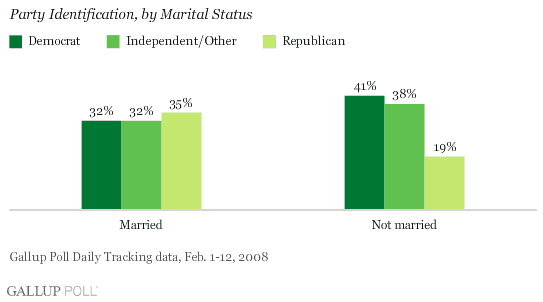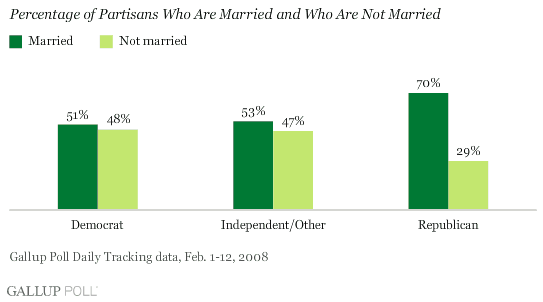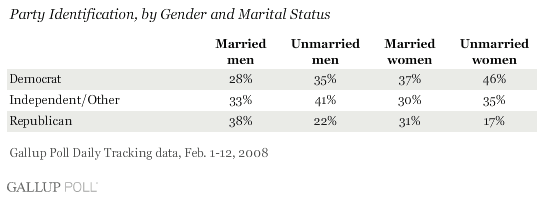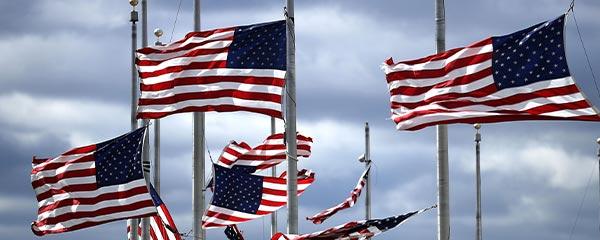PRINCETON, NJ -- It's not clear whether love and politics go together, but a special Valentine's Day review of Americans' party affiliation shows there is a strong relationship between marital status and party affiliation. Unmarried Americans are more likely to identify as Democrats than as independents or in particular Republicans, while married Americans tilt toward the GOP. Among all Americans who identify as Republicans, the married vastly outnumber the unmarried. Since both marriage and gender are related to party identification, their effects build on each other, such that married men are the most likely to identify with the Republican Party and unmarried women are the most likely to identify with the Democratic Party.
These results are based on an analysis of data from ║┌┴¤═° Poll Daily tracking, conducted Feb. 1-12, 2008, including interviews with more than 12,000 Americans aged 18 and older.
The majority of U.S. adults -- 57% according to the tracking results -- are currently married. Among this group, slightly more identify as Republicans (35%) than as independents (32%) or Democrats (32%). But among Americans who are not currently married -- including those who have never married, or are divorced, widowed, separated, or living with a partner-- 41% consider themselves Democrats, 38% independents, and just 19% Republicans.

The net result is that married Republicans outnumber unmarried Republicans by better than a 2-to-1 ratio. There are more married than unmarried independents and Democrats, but only by a slight margin in each group.

The gender gap in politics is well-documented, and the recent tracking results confirm this as a fact of American political life. Among women, 41% currently identify as Democrats, 32% as independents, and just 25% as Republicans. Men are more evenly divided between the two parties (32% Republican, 31% Democratic), during a time when the political mood strongly favors the Democratic Party. Thirty-seven percent of men do not affiliate with either party at the moment.
Thus, as one would expect, the variation in party preference is even more pronounced when taking into account both Americans' gender and their marital status. Married men show a 10-point gap in favor of the Republican Party, and are currently the only one of the four marriage-by-gender groups that favors the GOP. The Democratic advantage among married women is 6 points, but is much larger among unmarried men (13 points) and in particular unmarried women (29 points).

Implications
Clearly, married Americans (especially married men) form a large part of the Republican base. The marriage gap has been evident in voting preferences for president since 1996 (as far back as ║┌┴¤═° has data), and the data analyzed here indicate that it will continue in the 2008 election.
Survey Methods
Results are based on telephone interviews with 12,181 national adults, aged 18 and older, conducted Feb. 1-12, 2008, as part of ║┌┴¤═° Poll Daily tracking. For results based on the total sample of national adults, one can say with 95% confidence that the maximum margin of sampling error is ┬▒1 percentage point.
For results based on the samples of 6,896 married Americans and 5,205 unmarried Americans, the maximum margin of sampling error is ┬▒1 percentage point.
For results based on the samples of 6,066 men and 6,115 women, the maximum margin of sampling error is ┬▒1 percentage point.
For results based on the samples of 3,891 married men, 2,129 unmarried men, 3,005 married women, and 3,076 unmarried women, the maximum margin of sampling error is ┬▒2 percentage point.
Interviews are conducted with respondents on land-line telephones (for respondents with a land-line telephone) and cellular phones (for respondents who are cell-phone only).
In addition to sampling error, question wording and practical difficulties in conducting surveys can introduce error or bias into the findings of public opinion polls.
